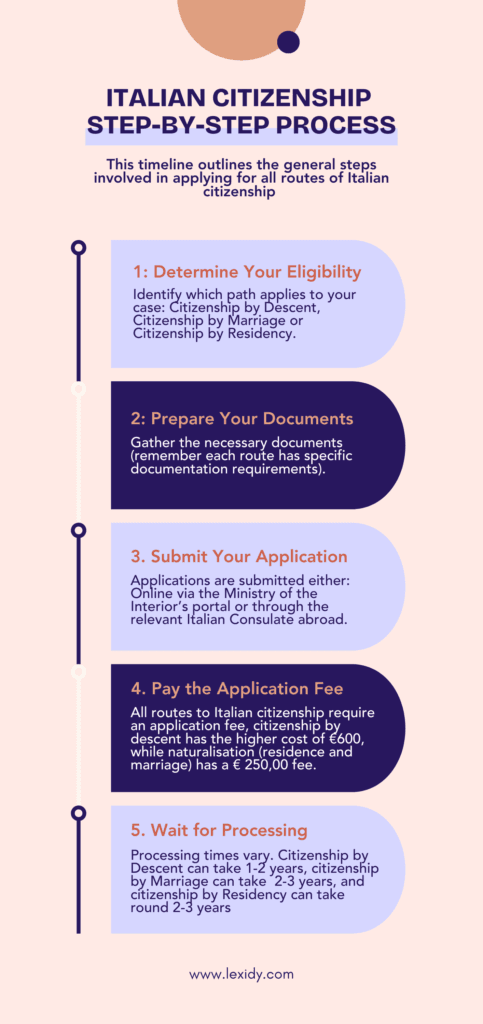Italian citizenship has become more desirable than ever — offering access to the European Union, freedom of movement, and for some, a chance to reconnect with their Italian heritage. But recent changes to Italian citizenship law in 2025 have made the process more complex and selective.
For many applicants, the journey to Italian citizenship now requires a deeper understanding of updated eligibility rules and higher application fees.
Whether you’re claiming citizenship through family descent, marriage, or long-term residency, it’s important to understand how these new rules affect your path. In this guide, our trusted team of Italian lawyers will explain what’s changed, who qualifies in 2025, and how working with legal experts can make applying for Italian citizenship smoother, faster, and stress-free.
Table of Contents
- Who Qualifies for Italian Citizenship in 2025?
- How to Get Italian Citizenship by Descent (Jure Sanguinis)
- How to Get Italian Citizenship by Marriage
- How to Get Italian Citizenship by Residency
- Acquiring Italian Citizenship: Step-by-Step Process (All Routes)
- Should You Apply Now or Wait?
- How a Citizenship Lawyer Can Help
- Your Path to Italian Citizenship Starts Here
Who Qualifies for Italian Citizenship in 2025?
In 2025, there are three main ways to get Italian citizenship: by descent (Jure Sanguinis), by marriage, or by residency.
While these paths have existed for many years, recent legal reforms have introduced stricter rules, higher application fees, and additional requirements, especially for citizenship by descent.
Eligibility depends on factors like your family connection to Italy, how long you’ve lived in the country, or your marriage to an Italian citizen. However, the new regulations include limits on claiming citizenship through distant ancestors and updated residency requirements. This makes applying for citizenship more complex than ever.
Understanding which route applies to your situation is the first step toward obtaining Italian citizenship, and professional guidance can help you navigate the process smoothly.
Want to know if you qualify? Our Italian Citizenship service page has the full eligibility checklist plus answers to your most frequently asked questions.
How to Get Italian Citizenship by Descent (Jure Sanguinis)

Italian citizenship by descent, known as Jure Sanguinis, is one of the most common ways for people with Italian heritage to get citizenship. However, in 2025, Italy introduced stricter rules that limit who qualifies.
2025 Eligibility Rules
Italian citizenship by descent (Jure Sanguinis) allows individuals with Italian heritage to claim citizenship, but a major legal shift took place in 2025.
Under Decree Law No. 36, Italy has narrowed eligibility criteria significantly. As of now, applicants must meet one of the following conditions:
- You applied for recognition of Italian citizenship at an Italian Consulate or City Hall on or before March 27, 2025.
- You filed a judicial application with an Italian court on or before March 27, 2025.
- You have a parent or grandparent who was born in Italy.
- You have an Italian parent who lived in Italy continuously for at least two years before your birth.
This means that claims based on great-grandparents or more distant ancestors are no longer accepted under the current law, unless you already submitted your application or court claim before the March 27 deadline.
The new rule also applies only to individuals who already hold another citizenship to avoid situations of statelessness.
Because this decree is still under parliamentary review, there is a chance it may be amended, softened, or overturned in the coming months, adding another layer of uncertainty for applicants relying on more distant ancestry.
Required Documents
Applicants must collect official records for each generation in their family line, including:
- Birth certificates.
- Marriage certificates.
- Death certificates (if applicable).
- Proof of non-naturalization or naturalization status (depending on the case).
- Translations and Apostilles for foreign documents.
Common Challenges
Applying for Italian citizenship by descent often seems straightforward until you start gathering documents. Many applicants face unexpected obstacles that can delay or complicate the process.
Here are the most common challenges:
- Not understanding changing regulations regarding requirements.
- Missing or damaged birth records.
- Name discrepancies across documents.
- Documents not properly legalized or translated.
- Long wait times for records from Italy or other countries.
These challenges are why working with a citizenship lawyer is often recommended, especially for applicants dealing with missing records or multiple generations.
When Legal Help is Essential
Due to the strict documentation requirements and recent legal changes, working with a lawyer can save significant time and frustration.
An experienced citizenship lawyer can help:
- Verify your family line.
- Request documents from Italian archives.
- Guide you on the correction of iinconsistencies or missing records.
- Ensure your application meets the updated requirements.
How to Get Italian Citizenship by Marriage

In 2025, new reforms significantly changed the rules for acquiring Italian citizenship through marriage. If you’re married to an Italian citizen, it’s essential to understand these recent updates before applying.
Who Qualifies?
As of 2025, even if no official document has been published, the Ministry of Interior has already indicated that Italian citizenship by marriage will now only be available to spouses who reside in Italy.
Due to Decree-Law No. 36 of March 28, 2025, foreign spouses living abroad can no longer apply for citizenship through marriage.
This means that living in Italy as a legal resident is now a mandatory requirement for this pathway.
Residency Timelines
For spouses living in Italy, the waiting times remain the same:
- Apply after 2 years of legal residency while married.
- The waiting period is reduced to 1 year if the couple has children (biological or adopted).
Language Requirement
Previously, applicants were required to pass a certified B1-level Italian language exam.
However, in 2025, Italy’s Constitutional Court ruled that this requirement could be considered unconstitutional in cases where applicants have proven learning difficulties or limitations.
While the B1 Italian language level is still required in most cases, this ruling may open exemptions for those who can demonstrate valid reasons for not meeting the language requirement.
Other Key Requirements
Your Italian spouse must be registered as a resident in Italy (or with AIRE if living abroad, for other administrative processes)
- You must provide a clean criminal record.
- Proof of continuous cohabitation may be required.
What This Means for Applicants
If you are living abroad, applying for Italian citizenship by marriage can no longer be possible under the 2025 decree-law.
For spouses already living in Italy, working with a lawyer is strongly recommended to ensure compliance with residency proof, document preparation, and language requirements — especially if seeking an exemption. Contact us below to get a free consultation.
How to Get Italian Citizenship by Residency

Italian citizenship by residency, also called citizenship by naturalization, is available to foreign nationals who have legally and continuously lived in Italy for a set period of time.
This pathway is designed for foreigners who have built their lives in Italy and can demonstrate full integration into Italian society.
Who Qualifies?
Currently, most non-EU citizens can apply after 10 years of continuous legal residency in Italy, and EU Nationals, as well as children or grandchildren of Italian citizens, enjoy faster access to Citizenship (4 years and 3 years of residence, respectively).
Applicants must prove:
- 10 years of uninterrupted residency.
- Financial stability (tax returns showing sufficient income).
- Clean criminal record.
- Registration with the local municipality (Comune) throughout their stay.
Important Note for 2025
A referendum is summoned by August 8 and 9, 2025, and that could change the residency requirement from 10 years to 5 years for non-EU citizens.
If approved, this change would significantly speed up the naturalization process for many applicants seeking Italian citizenship through residency.
Required Documents
Applicants must provide:
- Valid passport and Italian residence permit.
- Proof of continuous residency (minimum 10 years).
- Tax returns for the last 3 years.
- Criminal record certificates from Italy and your country of origin.
- Birth certificate (legalized and translated into Italian).
- Civil status documents (marriage, divorce, if applicable).
Acquiring Italian Citizenship: Step-by-Step Process (All Routes)
While the eligibility requirements differ depending on how you qualify for Italian citizenship — by descent, marriage, or residency — the application process follows a similar structure.
No matter which route you take, preparing complete and accurate documentation is essential for a successful application.

Step 1: Determine Your Eligibility
Identify which path applies to your case:
- Citizenship by Descent (Jure Sanguinis).
- Citizenship by Marriage.
- Citizenship by Residency.
Step 2: Gather Required Documents
Each route has specific documentation requirements, but in general, you will need:
- Valid passport and ID.
- Birth certificate (legalized and translated).
- Criminal background checks (from Italy and your home country).
- Proof of income or financial stability (for residency or marriage routes).
- Marriage certificates (if applicable).
- Ancestor documentation (for citizenship by descent).
Step 3: Submit the Application
Applications are submitted either:
- Online via the Ministry of the Interior’s portal (for residency and marriage applications in Italy).
- Through the relevant Italian Consulate abroad (mainly for citizenship by descent).
Step 4: Pay the Application Fee
As of 2025, all routes to Italian citizenship require an application fee, citizenship by descent has the higher cost of €600, while naturalisation (residence and marriage) has a € 250,00 fee. This is non-refundable.
Step 5: Wait for Processing
Processing times vary:
- Citizenship by Descent: Can take 1-2 years, depending on the consulate.
- Citizenship by Marriage: Typically 2-3 years.
- Citizenship by Residency: Around 2-3 years, depending on case complexity.
Common Mistakes to Avoid
Applying for Italian citizenship is document-heavy and highly detail-oriented. Even small errors can lead to delays, rejection, or the need to restart the process.
Here are the most common mistakes applicants make — and why working with a lawyer can help you avoid them:
- Missing or Incorrect Documentation: Every document must meet strict Italian legal standards, including legalization and certified translation. Missing pages, unofficial copies, or incorrect formats can lead to immediate rejection.
- Name Discrepancies: It’s very common for names to change over generations or be spelled differently across documents (especially for citizenship by descent).
- Incomplete Residency Registration: Your residenza in Italy must have been continuous and correctly registered at your local Comune. Any gaps or inconsistencies in your registration can restart your residency clock.
- Failure to Meet Tax or Income Requirements: Applicants must prove financial stability — especially for citizenship by residency. Missing tax declarations or insufficient income can prevent approval.
- Delays in Obtaining Italian Records: Requesting documents from Italian municipalities can take several months. Starting this process early — or working with a local legal team — is crucial to avoid delays.
- Mistakes in Online Application: Incorrectly uploading documents or technical mistakes in the online portal can slow down your application — or require resubmission.
Should You Apply Now or Wait?
With recent legal reforms and ongoing political debate in Italy, deciding when to apply for Italian citizenship depends on your situation and the specific route you qualify for.
Citizenship by Descent: Why Waiting Might Be Smart
In 2025, a new decree-law limited citizenship by descent to those with a parent or grandparent born in Italy. However, this change is still under review.
The Italian Parliament has 60 days to confirm, amend, or reject this decree-law. Given Italy’s current political instability, it’s unclear whether the new restrictions will remain, be softened, or be overturned entirely.
If you are applying through a more distant ancestor (great-grandparent or beyond), it may be worth waiting for clarity before investing time and resources into the process.
Citizenship by Marriage or Residency: Apply Now
For other routes — like citizenship by marriage or residency — it’s generally recommended to apply as soon as you meet the requirements.
Recent legal changes have already tightened the rules for these pathways, and there is a risk of further reforms or increased restrictions in the near future.
Delaying could lead to longer waiting times, higher costs, or new eligibility conditions.
How a Citizenship Lawyer Can Help

Applying for Italian citizenship isn’t just about filling out forms — it’s about navigating a complex legal system with constantly changing rules.
Whether you’re applying by descent, marriage, or residency, here’s how an experienced citizenship lawyer can save you time, stress, and costly mistakes:
1. Assess Your Eligibility
A lawyer will analyze your personal situation and the latest legal developments to confirm which citizenship route is best for you — and whether it’s better to apply now or wait.
2. Collect and Verify Documents
From sourcing Italian records to correcting name discrepancies and managing translations, your lawyer ensures every document meets Italian legal standards.
3. Handle the Application Process
Whether applying through a consulate abroad or the online portal in Italy, a lawyer will prepare your application correctly for submission — minimizing errors that can cause delays.
4. Communicate with Italian Authorities
Dealing with Italian consulates, local municipalities, or government offices can be challenging — especially from abroad. A lawyer has better access to communicating with such authorities if needed.
5. Save Time and Avoid Mistakes
Citizenship applications can take years, but errors or missing documents can restart the process entirely. Legal support ensures your application is accurate, complete, and fully compliant.
Your Path to Italian Citizenship Starts Here
Italian citizenship offers incredible opportunities, from reconnecting with your heritage to gaining EU rights and freedom of movement. But in 2025, the rules are changing. Whether you’re applying by descent, marriage, or residency, staying informed and getting expert guidance has never been more important.
With political uncertainty and stricter requirements on the horizon, starting the process now or getting personalized legal advice can make all the difference.
At Lexidy, our team of citizenship lawyers is here to guide you every step of the way. We’ll assess your eligibility, handle your documents, and manage your application so you can focus on what matters most: becoming an Italian citizen.
Whether you’re ready to move forward or just exploring your options, you’ll find everything you need on our Italian Citizenship service page, or simply fill out the form below to speak with our team.

